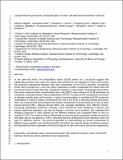| dc.contributor.author | Ragelle, Heloise | |
| dc.contributor.author | Naba, Alexandra | |
| dc.contributor.author | Larson, Benjamin | |
| dc.contributor.author | Zhou, Fangheng | |
| dc.contributor.author | Prijic, Miralem | |
| dc.contributor.author | Whittaker, Charles A. | |
| dc.contributor.author | Del Rosario, Amanda M | |
| dc.contributor.author | Langer, Robert S | |
| dc.contributor.author | Hynes, Richard O | |
| dc.contributor.author | Anderson, Daniel Griffith | |
| dc.date.accessioned | 2020-08-31T14:46:24Z | |
| dc.date.available | 2020-08-31T14:46:24Z | |
| dc.date.issued | 2017-06 | |
| dc.date.submitted | 2017-02 | |
| dc.identifier.issn | 0142-9612 | |
| dc.identifier.uri | https://hdl.handle.net/1721.1/126846 | |
| dc.description.abstract | In the stem-cell niche, the extracellular matrix (ECM) serves as a structural support that additionally provides stem cells with signals that contribute to the regulation of stem-cell function, via reciprocal interactions between cells and components of the ECM. Recently, cell-derived ECMs have emerged as in vitro cell culture substrates to better recapitulate the native stem-cell microenvironment outside the body. Significant changes in cell number, morphology and function have been observed when mesenchymal stem cells (MSC) were cultured on ECM substrates as compared to standard tissue-culture polystyrene (TCPS). As select ECM components are known to regulate specific stem-cell functions, a robust characterization of cell-derived ECM proteomic composition is critical to better comprehend the role of the ECM in directing cellular processes. Here, we characterized and compared the protein composition of ECM produced in vitro by bone marrow-derived MSC, adipose-derived MSC and neonatal fibroblasts from different donors, employing quantitative proteomic methods. Each cell-derived ECM displayed a specific and unique matrisome signature, yet they all shared a common set of proteins. We evaluated the biological response of cells cultured on the different matrices and compared them to cells on standard TCPS. The matrices lead to differential survival and gene-expression profiles among the cell types and as compared to TCPS, indicating that the cell-derived ECMs influence each cell type in a different manner. This general approach to understanding the protein composition of different tissue-specific and cell-derived ECM will inform the rational design of defined systems and biomaterials that recapitulate critical ECM signals for stem-cell culture and tissue engineering. | en_US |
| dc.description.sponsorship | National Cancer Institute (Grants U54-CA126515 and U54-CA163109) | en_US |
| dc.language.iso | en | |
| dc.publisher | Elsevier BV | en_US |
| dc.relation.isversionof | http://dx.doi.org/10.1016/j.biomaterials.2017.03.008 | en_US |
| dc.rights | Creative Commons Attribution-NonCommercial-NoDerivs License | en_US |
| dc.rights.uri | http://creativecommons.org/licenses/by-nc-nd/4.0/ | en_US |
| dc.source | Prof. Hynes | en_US |
| dc.title | Comprehensive proteomic characterization of stem cell-derived extracellular matrices | en_US |
| dc.type | Article | en_US |
| dc.identifier.citation | Ragelle, Héloïse et al. "Comprehensive proteomic characterization of stem cell-derived extracellular matrices." Biomaterials 128 (June 2017): 147-159 © 2017 Elsevier Ltd | en_US |
| dc.contributor.department | Massachusetts Institute of Technology. Institute for Medical Engineering & Science | en_US |
| dc.contributor.department | Massachusetts Institute of Technology. Department of Chemical Engineering | en_US |
| dc.contributor.department | Harvard University--MIT Division of Health Sciences and Technology | en_US |
| dc.contributor.department | Massachusetts Institute of Technology. Department of Biological Engineering | en_US |
| dc.contributor.department | Koch Institute for Integrative Cancer Research at MIT | en_US |
| dc.relation.journal | Biomaterials | en_US |
| dc.eprint.version | Original manuscript | en_US |
| dc.type.uri | http://purl.org/eprint/type/JournalArticle | en_US |
| eprint.status | http://purl.org/eprint/status/NonPeerReviewed | en_US |
| dc.date.updated | 2019-09-26T14:51:51Z | |
| dspace.date.submission | 2019-09-26T14:51:52Z | |
| mit.journal.volume | 128 | en_US |
| mit.metadata.status | Complete | |
